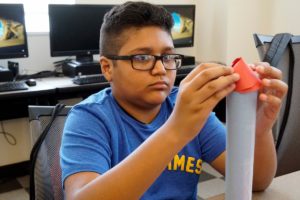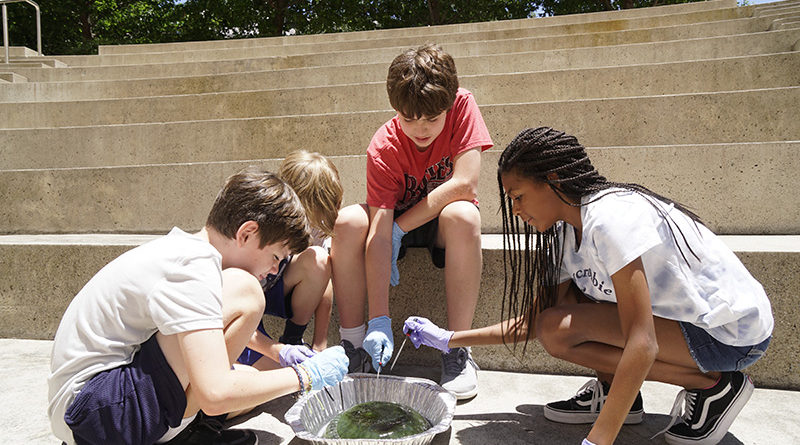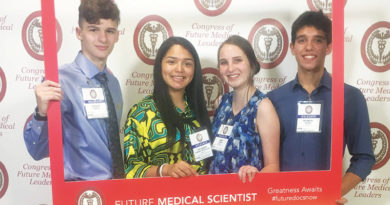CSI: A Camp for STEM Investigation
In a trashed meeting room with papers strewn everywhere, tracks of fresh soil, and a blinking computer screen, teammates donned gloves and carefully searched for clues.
(ABOVE: Middle school campers gather evidence as they work to solve a “crime.” Photo Courtesy SMU)
To the sounds of a clicking camera and sketching on paper, young investigators took measurements and bagged and labeled such evidence as dirt from the floor, a discarded cup, a USB drive, and a handwritten note.
The latest episode from the TV show CSI? No. It’s summer camp at SMU — Lyle style.
Crime Scene Investigation — one of four camps offered at SMU’s Lyle School of Engineering — is designed to help middle schoolers “open their eyes to see (whether a career in science, technology, engineering, or math) is something they are interested in,” said Kristine R. Reiley, program specialist for K-12 outreach and summer programs.
Reiley has been with the summer programs since 2009 and worked with former Caruth Institute for Engineering Education director Delores Etter to create camps that incorporate STEM disciplines.
“We typically stick with non-violent crimes and the various techniques used to solve those.” – Marissa Infante

In the hands-on Crime Scene Investigation curriculum, campers explore fingerprinting, soil and DNA analysis, paper chromatography to determine the type of ink used, and a cyber-security presentation relating to the computer and USB drive left behind.
They also hear from crime solving-professionals including a CSI tech from the Dallas Police Department and officers from the SMU Police Department, SWAT, the FBI, and a K-9 unit.
A favorite among campers and staff is a Dallas forensic pathologist.
“She captivates the students with real-life stories and photos while explaining some tips to determine a victim’s cause of death in a very age-appropriate way,” said Marissa Infante, a sixth-grade science teacher at The Episcopal School of Dallas who teaches at SMU’s CSI camp.
The mock crime scenes campers process aren’t the typical gory scenarios seen on TV, Infante said. “We typically stick with non-violent crimes and the various techniques used to solve those.”
The students are enthralled with the idea of processing a crime scene, and in doing so they learn an array of science vocabulary, math skills, and ways technology can be used to solve and prevent crimes, Infante said.
Jonathan Vides, an eighth-grader at William B. Travis Academy, attended CSI camp twice and wished he could go again.
CSI camp is for sixth-and seventh-graders so he will attend Advanced Engineering Camp this summer instead.
“I really wanted to figure out how to solve problems, and … know what they did for that job, and what qualifications you needed to do that job,” Vides said.
For more information about Crime Scene Investigation and other camps such as Introduction to Engineering, Advanced Engineering, and Engineering Design Experience go to, click here.








